-
How Much Sleep Do Young Learners Need?
When your child starts early childhood education, you may wonder how the extra demands on his or her day will impact his or her sleep schedule. It’s important for young learners to get the right amount of sleep every day to remain happy and engaged in his or classroom in the early childhood learning center in Pembroke Pines .
Sleep needs change with ages. Most toddlers need between 11 and 14 hours of sleep per day, though some may need as little as nine and as much as 16. Preschool kids need about 10 to 13 hours, though some can thrive with as few as eight hours, while others may need 14. Pre-K and Kindergarten kids generally need 10 to 13 hours of sleep, with a minimum of eight and a maximum of 14 hours. Keep in mind that these hours can include daily naps, though early bedtimes are generally best for giving kids the full amount of rest they need.

-
Easy Tips for Improving Attention Spans in Pre-K Students
Attention is a challenging issue for parents and teachers of pre-K students alike. In the pre-K classroom, working on attention spans is part of the learning process, as students become more adept at learning the differences between work time and playtime. Attention span issues can be even more challenging today, when young children are accustomed to entertainment with digital devices and constant distractions. Although the ability to be attentive naturally increases with age, there are things you can do to help your student in pre-K in Pembroke Pines . Try these tips to boost the attention span of your pre-K student.
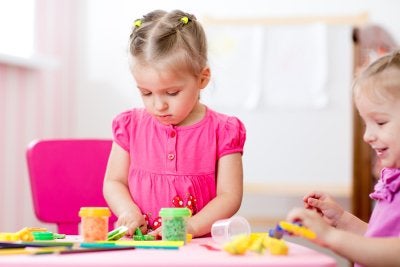
Reduce Distractions
Nearly anything can be a distraction when a young student is tackling a task he or she may not really want to do. Before your child has to concentrate on something, make sure he or she is well rested, not hungry or thirsty, and has used the bathroom. Don’t have the TV or music on, and keep digital devices tucked away. Give your child space and time to concentrate on one thing, and he or she will become more adept at tuning his or her attention to the right things.
Get Ready for the Day
If your child’s attention problems occur most often in the pre-K classroom, make sure he or she is ready for the day when you arrive at school. Avoid showing DVDs in the car, and eat breakfast at home when possible, instead of on the go. Put shoes on at home, rather than in the car. The ride to school should be a calm time when you can help your child focus on getting ready for school. Watching a DVD while frantically eating breakfast and rushing to finish getting dressed in the car will result in your child arriving at school feeling anxious and exasperated instead of ready to sit down in the classroom.
Have Realistic Expectations
As a general rule of thumb, the number of minutes your child should be able to pay attention is his or her age in years multiplied by two to five . Anything outside of that is unrealistic. Try breaking tasks up into timed chunks that fit into these windows so your child doesn’t become frustrated, which negatively impacts attention spans.
-
Selecting a Kindergarten for Your Child
As more choices become available, parents are finding it increasingly difficult to settle on a school for their children. Are you searching for the ideal kindergarten in Pembroke Pines ? If so, then continue reading for tips on choosing the best one for your child and your family’s needs.

Discover Your Options
To begin the process of selecting a kindergarten for your child, start by researching what schools are available in your area. Then, look at the websites of any schools that you are interested in, ensure that the information posted there is up to date, and read any unbiased parent reviews that you can find. If possible, talk to friends, family, and neighbors that have children enrolled in kindergarten and ask them for their opinions.
Consider Your Needs
The next step in this process is to think about the needs of your family and to identify the schools which best support them. Some examples include the school’s proximity to your home or work, its transportation system and bus schedule, and its enrollment cost. Weighing in these factors can be essential for selecting a kindergarten and school that works for your family long-term.
Study the Program
What a school can offer for your child can do a great deal in helping you decide on a kindergarten. Do you want your child exposed to second languages, the arts, or other alternative programs? Also, consider how much emphasis the school puts on physical education and discover if they feature a gymnasium and playgrounds. Finally, study the kindergarten’s curriculum to get an idea of the education to which your child will be exposed.
Meet the Teachers
In many cases, meeting your child’s potential educators can be the easiest way to come to a decision about what kindergarten is best for her needs. Considering that your young child will be away from you for long periods, it’s important to choose a program whose teachers you feel comfortable with and are nurturing towards the students. Make an appointment with any school you are interested in to give yourself a chance to meet the principal and kindergarten teachers.
-
What Is Pre-Kindergarten?
Has your child recently turned 3 or 4? If so, then you may be wondering when she should begin school. If your child is still too young for kindergarten, then you may benefit from enrolling her in pre-kindergarten . Continue reading to learn about what to expect when your child joins pre-k in Pembroke Pines.
Pre-kindergarten programs consist of daily activities and classes that are designed for children around the age of 4. Focused on providing fun, fostering creativity, and preparing children for future academic success, pre-k activities can include games, projects, and experiences that encourage children to enjoy learning and that teach early math, reading, language, and social skills.
Because pre-kindergarten introduces your child to a traditional academic environment, this type of program can help ensure her success in later grades. At the same time, pre-k provides day care for children and can help acclimate your child to being away from her family for extended periods. For these reasons, enrolling her in a pre-kindergarten program can be highly beneficial for your child.
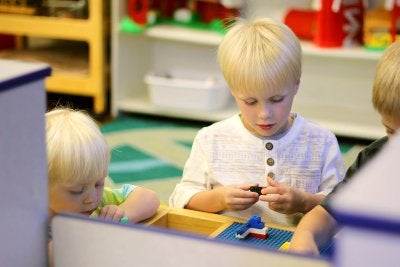
-
Helpful Learning Tips for Kindergarten
When you are preparing your child to begin kindergarten, you may find yourself wondering what you can do to help him succeed. Did you recently enroll your child in kindergarten in Pembroke Pines? If so, then watch this video for tips on helping him learn during this time.
One of the best ways to ensure that your child is available to absorb his kindergarten curriculum is to develop a schedule that allows him 10 to 12 hours of sleep per night and to provide him with plenty of nutrition. Also, speaking with your child and having extended conversations with a back and forth exchange is a great way in which to improve his kindergarten readiness.
-
Developmental Milestones in Four-Year-Olds
Four is an exciting year for parents and children alike. Four-year-olds are eagerly embracing their newfound independence and they are actively developing the skills they will need in kindergarten and beyond. You’ll begin to see your child take on a more clearly defined personality as he or she progresses through pre-kindergarten . Consider talking to your child’s pre-k teacher in Pembroke Pines about ways of supporting your child’s healthy development at home.
Motor Skills
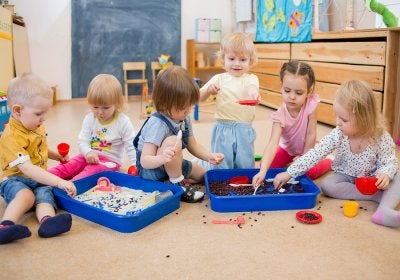 Pre-k kids are working on both gross and fine motor skills. In fact, parents are often amazed at the boundless energy of their four-year-olds. A four-year-old should generally be able to balance briefly on one foot, hop on one foot, and walk up the stairs without assistance. As pre-k kids progress toward their fifth birthdays, they begin to try new skills like somersaulting, climbing, swinging, and skipping. Fine motor skills become much more developed during this year. Your child should be able to print some letters, use cutlery, copy geometric patterns, and get dressed and undressed without assistance.
Pre-k kids are working on both gross and fine motor skills. In fact, parents are often amazed at the boundless energy of their four-year-olds. A four-year-old should generally be able to balance briefly on one foot, hop on one foot, and walk up the stairs without assistance. As pre-k kids progress toward their fifth birthdays, they begin to try new skills like somersaulting, climbing, swinging, and skipping. Fine motor skills become much more developed during this year. Your child should be able to print some letters, use cutlery, copy geometric patterns, and get dressed and undressed without assistance.Language Use
You might notice that your four-year-old eagerly looks forward to story time. He or she may even begin recalling parts of a story on his or her own. During this year, he or she should begin speaking sentences longer than five words, use the future tense, and clearly speak his or her name and address.
Cognitive Development
Pre-kindergarten programs guide children in learning the essential skills they’ll need later on, including pre-math skills. During this year, your child should be able to name at least four colors and he or she should have a general understanding of the passage of time. Your child should be able to count 10 or more objects.
Socio-Emotional Development
One major benefit of high-quality pre-k programs is the social skills that kids acquire. Your child will enjoy spending time with friends. He or she will adjust to the idea of cooperative and group play. Your child may be very interested in fantasy play, but in many cases he or she will know how to distinguish reality from fantasy.
-
Highlighting Pre-Academic Skills Learned in Preschool
Giving your child the experience of preschool will help as he progresses to pre-kindergarten and into grade school. Various preschool activities can form the building blocks of early academic skills and child development in Pembroke Pines. Through these fun and engaging activities, your child will gain new experiences that will follow him throughout his academic career.
Preschool classes are typically filled with laughter and playtime. However, that same playtime is teaching children the basic foundational concepts associated with reading, writing, science, and math. A child might see his coloring page as a fun craft, but his preschool teacher knows that he is learning fine motor skills to help with future writing worksheets. The class may enjoy digging in the dirt to plant seeds, but their teacher knows that she is teaching them a simple concept of earth science. These are just a few examples of the various skills and life lessons your child will learn with a preschool curriculum. If you are curious to learn more, contact a preschool near you to schedule a campus visit.

-
Helping Your Child Learn How to Grip a Pencil
As your child enters preschool near Pembroke Pines, he may struggle with the concept of gripping a pencil. This is normal, especially in early childhood education . Children are still developing their fine motor skills and learning how writing on paper will help their academic success.
Watch the short video for an easy way to help your child grip a pencil. You would hand your child a pencil, sharpened end toward him. Ask him to grip the pencil between his thumb and pointer finger. As he grips, slowly move the pencil to rest on the skin webbing between these two digits.
Be sure to watch your child as he does his preschool or kindergarten work. Notice if he grips the pencil too hard. If he has blisters on his hands or his knuckles are white while writing, ask him to loosen his grip. This will help encourage him to hold the pencil correctly.
-
What Do Children Learn in Pre-K Programs
Pre-kindergarten , also called pre-k, is an essential period of education and interaction in every child’s life. By attending a qualified pre-k program in Pembroke Pines, children can learn a variety of necessary skills and subjects that will positively influence their future education and social interactions. If you have ever been curious about what children learn in their pre-k programs, speak with a pre-k school near you and continue reading to learn more.
Love of Learning
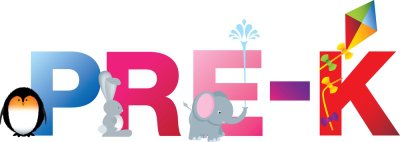 One of the most important learning skills children can learn with pre-k is a love of learning. Pre-kindergarten teachers are trained in making learning exciting. They can show children the adventure found when trying to discover something new. As children experience this excitement and thrill, they are learning skills to help with future reading, math, and history subjects. When children can associate learning with fun and excitement, they are more likely to enjoy learning as they continue through school.
One of the most important learning skills children can learn with pre-k is a love of learning. Pre-kindergarten teachers are trained in making learning exciting. They can show children the adventure found when trying to discover something new. As children experience this excitement and thrill, they are learning skills to help with future reading, math, and history subjects. When children can associate learning with fun and excitement, they are more likely to enjoy learning as they continue through school.Teamwork and Independence
Though the two terms, teamwork and independence, are contradictory, they are both important skills children learn in their pre-kindergarten class. Up until the pre-kindergarten age, usually 4 years old, many children may not have had much interaction with other children. Some children have only relied on their parents to do most chores for them. By attending pre-k, children can learn two valuable skills needed to get through life. They can learn how to play and work well with their peers. They can also learn how to clean up their messes or finish a project by themselves.
Early Subject Skills
Many parents enroll their children in a pre-k program because it gives the children a head start in learning necessary subject skills. Children will learn, in fun and engaging ways, about the early concepts of reading, math, and language. They are often exposed to earth science, art, music, and simple history. As children learn these pre-academic skills, they can enter kindergarten and grade school better equipped to learn harder concepts.
-
Planning for Pre-K: What Parents Need to Know
If you’re a parent hoping to give your child a jumpstart in kindergarten by enhancing her pre-math, pre-reading, social, and language skills, pre-kindergarten programs in Pembroke Pines are an excellent option. If you’re planning to enroll your child in a pre-kindergarten program, there are a few good things to know to plan for pre-k.
Find the right program.
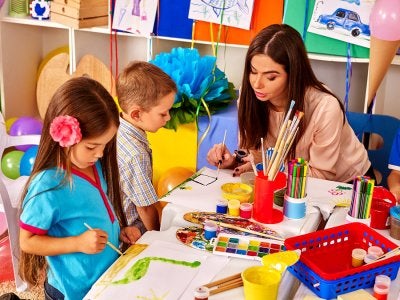 Before choosing a pre-k program, there are a few essential features to look for during your search. Ask the school if you can schedule an appointment. This will give you a chance to speak with the teachers, ask questions, and see classes in progress. Look for classrooms where children are safe, active, and not wandering off by themselves. Your child should be in an environment where she is happy and not bored or distressed. Select a program where class sizes do not exceed 20 children, and that have at least 1 teacher for every 10 children. If your child is uncomfortable in larger groups, look for programs offering smaller classes of about 10 students.
Before choosing a pre-k program, there are a few essential features to look for during your search. Ask the school if you can schedule an appointment. This will give you a chance to speak with the teachers, ask questions, and see classes in progress. Look for classrooms where children are safe, active, and not wandering off by themselves. Your child should be in an environment where she is happy and not bored or distressed. Select a program where class sizes do not exceed 20 children, and that have at least 1 teacher for every 10 children. If your child is uncomfortable in larger groups, look for programs offering smaller classes of about 10 students.Find the right teachers.
The staff should be caring, sensitive, and responsive to the needs and requests of the children. Ask about the program’s curriculum, and find out how it promotes language, social, physical-motor, and cognition development for the students. The pre-k program’s teachers should hold 4-year college degrees and have specialized training in child development and early childhood education. Assistant teachers should have some training or college course work in child development or a discipline related to pre-kindergarten.
Prepare your child.
Before heading to pre-k, ready your child with a few skills that will help her flourish at her new program. At this age, children should be able to dress themselves. Take the time to teach your child how to tie her shoes, button a shirt, dress herself in a jacket and mittens, and put on her backpack. To prepare her for learning to write in school, teach her how to properly grip a pencil and show her how to draw circles, half circles, and straight lines.
RECENT POSTS
categories
- Uncategorized
- Early Learning Center
- Pre-K
- Children
- Child Care Center
- Preschooler
- Preschool Blog Category | Tanglewood Academy
- Preschool Lunch
- Tanglewood Academy
- After-School Program
- Toddler School
- Early Childhood Education
- preschool activities
- pre-kindergarten
- childhood education
- pre-kindergarten programs
- Children’s education
- enrichment opportunities
- Kindergarten
- Nurturing Education Environment
- Toddler Care
- Child Separation Anxiety
- Toddlers
- Summer camp
- summer activities
- VPK
- Voluntary Pre-K
- Outdoor Activities
- Smart Strategies
- Tie Shoes
- Snacks
- Physical Activities
- Education
- Enrichment Activities for Kids
- Early Education Activities
- Preschool Curriculum
- Classroom Learning
- APPLE accreditation
- Language Comprehension
